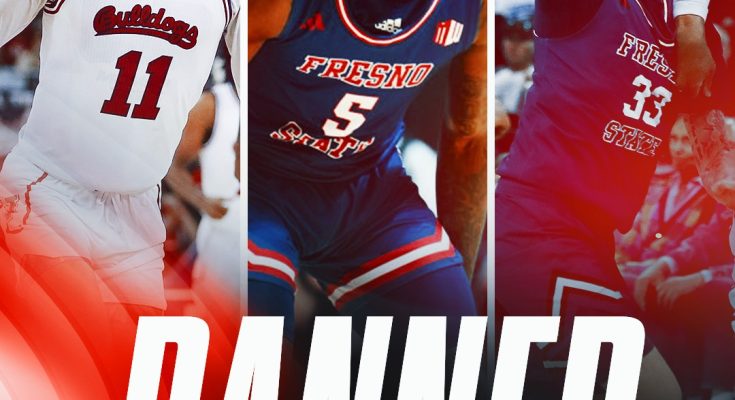In a shocking and sobering development within the world of college athletics, the NCAA has imposed a permanent ban on three men’s basketball players from Fresno State and San Jose State University due to their involvement in a betting scandal that compromised the integrity of the sport. The players—Mykell Robinson, Steven Vasquez, and Jalen Weaver—were found to have participated in a sports-betting related game manipulation scheme, a serious violation that runs counter to the fundamental principles of fair play and competition upheld by the NCAA. This ruling marks a significant moment in the ongoing battle against gambling-related corruption in collegiate sports, highlighting the growing risks posed by betting activities on amateur athletics.
The NCAA’s investigation revealed that the three players placed bets on their own performance during games, a practice that not only breaches NCAA regulations but also raises profound ethical concerns. The players’ actions constituted an attempt to influence the outcome or certain aspects of the games in which they participated, thereby undermining the legitimacy of the competition. This kind of game manipulation threatens to erode public trust and confidence in college sports, which depend heavily on the perception of fairness and unpredictability. In response to these findings, the NCAA has acted decisively, permanently banning Robinson, Vasquez, and Weaver from participating in any NCAA sports. This penalty is one of the harshest the organization can impose and serves as a clear warning to others about the severe consequences of engaging in betting-related misconduct.
The players involved were members of two distinct programs: Mykell Robinson and Steven Vasquez played for San Jose State University, while Jalen Weaver was part of Fresno State’s men’s basketball team. Both programs are part of the Mountain West Conference, which has been striving to maintain competitive and ethical standards amid increasing scrutiny over betting scandals in college sports. The investigation began when irregular betting patterns and suspicious in-game performance raised red flags among NCAA officials and athletic department compliance staff. Subsequent inquiries and evidence gathering confirmed that the players had knowingly engaged in wagering on their own performances, an act that is prohibited under NCAA rules, as it directly compromises the athlete’s duty to compete honestly.
This scandal emerges against a backdrop of increasing legalization and accessibility of sports betting across the United States. As more states embrace regulated betting markets, concerns have grown within the NCAA and the broader sports community about the vulnerabilities this creates for amateur athletes, who often lack the financial resources and guidance needed to resist the temptations or pressures of gambling. Unlike professional athletes, college players are bound by strict amateurism rules and generally do not receive salaries, making them potentially more susceptible to manipulation by external parties who might exploit gambling interests. The involvement of college athletes in betting-related schemes not only jeopardizes their athletic careers but also threatens the integrity of collegiate athletics as a whole.
Upon confirming the players’ involvement in the scheme, both Fresno State and San Jose State took immediate action. The schools released statements condemning the players’ behavior, emphasizing their commitment to ethical standards, and announcing that Robinson, Vasquez, and Weaver were no longer enrolled at their respective institutions. This step reflects the serious nature of the violations and the schools’ determination to distance their programs from misconduct that could damage their reputations and standing in the conference and nationally. Removing the players from their rosters and campuses also signals a commitment to accountability and the enforcement of strict compliance measures designed to prevent similar incidents in the future.
The ramifications of this scandal extend beyond the immediate consequences faced by the players and their schools. For the NCAA, this incident represents yet another challenge in its ongoing efforts to safeguard the integrity of college sports amid evolving betting landscapes. The organization has been ramping up educational programs and compliance initiatives aimed at informing student-athletes, coaches, and staff about the dangers and prohibitions related to gambling. However, incidents like this highlight the need for even more robust measures, including better monitoring of betting markets, enhanced collaboration with law enforcement, and perhaps revisiting the policies governing athlete education and support.
Moreover, this case raises broader questions about the pressures faced by student-athletes in today’s highly commercialized and competitive sports environment. Many college players struggle with balancing academic responsibilities, intense athletic commitments, and financial challenges, making them vulnerable to risky behavior, including gambling. The NCAA and member institutions are tasked with not only enforcing rules but also creating environments that foster healthy decision-making and provide adequate resources to help athletes resist such temptations. Counseling, mentorship programs, and financial literacy education are increasingly seen as critical components in preventing gambling-related misconduct.
The involvement of multiple players across two different programs also points to the potential existence of wider networks or influences that could encourage or facilitate such betting schemes. While the NCAA investigation has focused on the individuals directly involved, there remains concern about the presence of external actors—such as gamblers, bookies, or even insiders—who might exploit relationships with athletes to influence games. Detecting and dismantling these networks is a complex challenge requiring coordination between the NCAA, universities, law enforcement agencies, and betting regulators. The permanent bans on Robinson, Vasquez, and Weaver serve as a deterrent, but the underlying issues necessitate a systemic response to ensure that college sports remain free from corrupting influences.
For the athletes themselves, the consequences are devastating. Being permanently banned from NCAA sports effectively ends their competitive careers at the collegiate level and severely limits their prospects in professional basketball or related fields. Beyond losing the opportunity to play, they face reputational damage and potential legal repercussions, depending on the specifics of their involvement in the betting scheme. The fallout from such scandals often impacts their personal lives and future opportunities, underscoring the gravity of their actions. It also serves as a cautionary tale to other athletes who might be tempted to engage in similar misconduct, emphasizing that the NCAA and member institutions are committed to maintaining the integrity of competition at all costs.
From a fan and community perspective, such incidents are deeply disappointing. College sports enjoy passionate followings precisely because of the spirit of competition and the connection between athletes and their schools. When betting scandals come to light, they cast a shadow over the authenticity of the games and can diminish enthusiasm and trust among supporters. Both Fresno State and San Jose State are likely to face scrutiny and criticism from their fan bases, alumni, and local communities. Rebuilding trust will require transparency, accountability, and a demonstrated commitment to preventing future misconduct.
In response to this scandal, the NCAA is expected to review and possibly strengthen its policies around gambling and athlete conduct. There have been ongoing debates within the organization about how to best address the reality of legalized sports betting while protecting the amateur status and integrity of college athletes. Some advocate for stricter enforcement and harsher penalties, while others call for increased education and support mechanisms to help athletes navigate these challenges. This incident will undoubtedly add urgency to these discussions, potentially prompting new regulations or initiatives aimed at minimizing the risk of betting-related corruption.
Additionally, the roles of coaches, athletic directors, and compliance officers will come under heightened scrutiny. Ensuring that those in leadership positions are vigilant, proactive, and well-equipped to identify and prevent gambling-related violations is essential. The scandal highlights the importance of creating institutional cultures that prioritize ethics and integrity, where athletes feel supported and empowered to make the right decisions. It also underscores the need for continual training and resources for all stakeholders involved in college athletics.
As the NCAA moves forward, this case may serve as a pivotal example in shaping future governance around gambling in college sports. The organization must balance the growing acceptance of betting in the broader society with the unique vulnerabilities and responsibilities inherent in amateur athletics. While permanent bans are among the most severe punishments available, they are necessary to uphold the principle that sports must be contested fairly and without undue influence.
In conclusion, the permanent banning of Mykell Robinson, Steven Vasquez, and Jalen Weaver from Fresno State and San Jose State marks a significant and troubling moment for NCAA men’s basketball. Their involvement in a sports-betting related game manipulation scheme violates core values of fairness and integrity, prompting decisive action from the NCAA and their universities. This incident highlights the increasing risks posed by legalized sports betting in college athletics and the ongoing need for vigilance, education, and enforcement to protect the integrity of the game. The repercussions for the players are severe and serve as a warning to others, while the scandal challenges all stakeholders to redouble their efforts to safeguard the future of college sports. As the NCAA continues to adapt to the evolving landscape of sports betting, this case will remain a stark reminder of the high stakes involved in maintaining trust and fairness in amateur competition.



